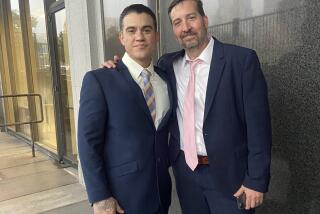Appellate Court Voids Conviction in Miller Murder
One of two men convicted of killing former Orange County Supervisor Edison Millerâs son has won the right to a new trial after an appellate court ruled that the Costa Mesa police obtained his confession illegally.
Richard James Wetherell, 29, had been sentenced to life without parole for first-degree murder in the slaying of Patrick Miller at Millerâs Costa Mesa home. The most damning evidence against him at his trial was his confession to police, which was tape-recorded.
The 4th District Court of Appeal, however, in an opinion made public Monday, reversed his conviction, asserting that the police had no right to continue interrogating Wetherell after he told them he did not want to talk anymore. The decision opened the door for a new trial during which Wetherellâs confession would not be admissible.
Justice Edward J. Wallin, in the appellate opinion, accused the Costa Mesa police of using âevery trick in the book to elicit incriminating statements . . . . They ignored his assertions of his right to terminate the interview.â
Sentence Less Severe
At a separate trial, Arthur J. Goldner was found guilty of the killing and sentenced to 25 years to life. His sentence was less severe than Wetherellâs because Goldnerâs jury did not find him guilty of robbery.
Goldner and Wetherell, who roomed together in Santa Ana, met Miller at a bar in the early morning hours of June 28, 1983, and returned to Millerâs home. Millerâs live-in girlfriend left the house with her two children after complaining about the noise the three were making. When she returned later in the day, she found Miller tied in a bedroom and covered with blood. He had been severely beaten and strangled. The house had been ransacked and some items were missing.
Wetherell was arrested that same day after he told a co-worker that he and another man had robbed and beaten a man.
At first, Wetherell reluctantly agreed to talk to police. Justice Wallin noted that several times during the police interrogation, Wetherell told them he had nothing to say, but they persisted in questioning him. At one point, he was told he could walk out the door. When he asked if he could really do that, one policeman said: âIs that where youâre at? . . . . You donât really have anything else to talk about?â Wetherell answered, âNo. Not really.â
Interrogation Details
âWe view this as a clear indication of his desire to terminate the interview, as (the officer) reluctantly told him he could,â Wallin stated.
The police interrogation continued, and after Wetherell was told he was under arrest, he confessed.
Wetherellâs trial attorney, William Kopeny of Santa Ana, had argued at the trial that the confession should not be admitted, citing the same arguments Wallin made. But Superior Court Judge David O. Carter, who presided at the trial, had disagreed.
Kopeny said Monday that his client had received a sentence of life without parole âin part because the prosecutor was able to paint a horrible picture of a horrible crime, primarily because of that confession. I think the truth is not as horrible as that confession, given under those circumstances, made it out to be.â
More to Read
Sign up for Essential California
The most important California stories and recommendations in your inbox every morning.
You may occasionally receive promotional content from the Los Angeles Times.










